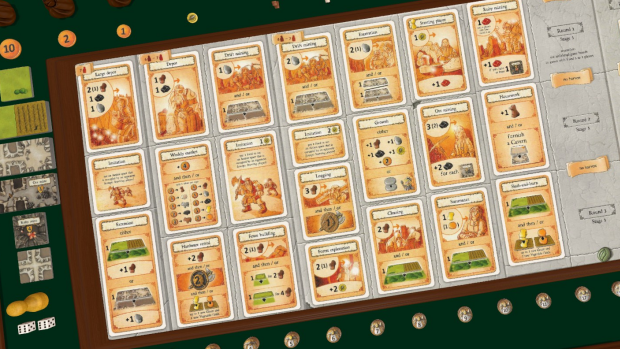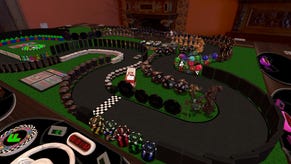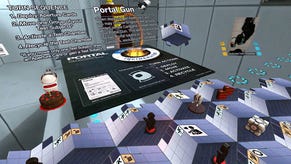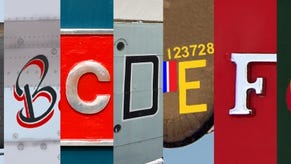How Do Boardgame Creators Feel About Tabletop Simulator And Infringing Mods?
Paid Mods, Licensed DLC, And Cease & Desist Letters
We asked Paul Dean of splendid boardgaming website Shut Up & Sit Down to investigate the future of the enormously successful boardgame software, Tabletop Simulator [official site]. He spoke to the creators, as well as boardgame designers, to discover their feelings towards copyright-infringing mods that replicate their games, plus the possible benefits of paid mods and licensed DLC.
The first time I saw anyone playing Tabletop Simulator, I was pointed toward a jury-rigged version of the hidden identity game Mascarade, cobbled together using Dota 2 art for the cards. My immediate response was, “Well, this definitely isn’t going to last.” What I saw in this new software wasn’t just an explosion of interest in board games, but also the potential for so many copyrights to be infringed.
I gave it a week or two before the first complaint would be raised, yet the response from much of the community was surprisingly positive and, instead, Tabletop Simulator went from strength to strength, gaining tremendous popularity and receiving rave reviews. Not only has this made it a huge success for developers Berserk, it’s also brought more board games to more people, many still blinking as they stumble into the bright new light of a hobby they thought was all about Cluedo and Monopoly.
Can this last? While Tabletop Simulator may well be a fine ambassador for board gaming, these mods aren’t making their original designers or publishers any money. Surely, surely there’s some resentment around this? Is it only a matter of time before Tabletop Simulator or one of its modders is held to account? What if Steam went ahead and re-introduced paid-for mods that allowed the original creators to sell versions of their work? I reached out to some board game designers to ask them what they thought and was surprised by many of their responses. The lawyers may not be rolling out just yet.
Tabletop Simulator was one of those unexpected successes. In a world of multimillion dollar crowdfunding campaigns, developer Berserk Games asked for just $3,000 to help finish a framework for simulating board and card games, but they received more than ten times that, pushing through stretch goals with the same ease you’d punch out cardboard tokens. In an email jointly representing its two developers, Jason Henry & Kimiko, the team say they’ve “received a great response” from players but certainly did not anticipate the scale of that response. Though Tabletop Simulator is still growing, forming itself in the larval tubes of Early Access, the mods have been flooding in.
“The support from the community has been fantastic,” they continue. “They create tons of great original content that we love playing. And surprisingly, we’ve been able to manage it just fine with just the two of us, excluding some great contract work. It’s definitely a 24/7 job, but we make sure to take some time off on the weekends to keep things sane.”
It’s also beyond Berserk to monitor the mods, something that would be a job in itself as “Tons” is an understatement. The Steam Workshop page for Tabletop Simulator is overflowing with well over 3,000 add-ons, from single playing pieces to full-fledged adaptations of games like Lords of Waterdeep and Settlers of Catan. Many are very capable adaptations of real-world board games and have clearly appropriated their mechanics, concepts and art, but none are official. Does an adaptation of the X-Wing miniatures game infringe on the rights of its designers, its publisher Fantasy Flight, and even Disney, the owner of Star Wars?
I have to admit, I’m surprised, even stunned at just how popular Tabletop Simulator has become. That’s a colossal body of mods representing countless of hours of work by modders to make digital representations of so many board games. Yet, for me, part of the appeal of board games is the personal and social aspects, elements that are sometimes even critical to the rules when players need to bluff, deceive or misdirect one another. Then there was that expectation that I mentioned, that certainty that the cease and desist orders were on their way. Surely so many toes have already been stepped on. What did board game designers themselves think?
At first, Colby Dauch, founder of Plaid Hat Games, gave me the kind of response I would very much expect. He hasn’t tried Tabletop Simulator yet because he “Appreciate[s] the physical component and meat-space aspect of board games. While running a board game company, I get plenty of opportunity to get my board game fix.” Board games are, of course, designed with this in mind and the purist within me gives a firm nod of agreement. However, while he also has some concern about people replicating his company’s hard work, it’s not quite for the reasons I’d expect.
“I'm concerned that knowing a game of ours is up there gives me some legal obligation to protect our copyright,” he continues. “I don't want to do that. I don't want to be the jerk that ruins people's fun and I think that digital versions of our games likely sell more physical copies than they deny sales.”
This sort of tolerance isn’t what I expected, but the board games industry works rather differently to that of video games. Dauch is correct that digital incarnations can have a positive impact on a game’s exposure and this is not only because they may reach different people, but also because that may be the only way they reach those people. Board games are physical objects that, as well as requiring shipping and distribution, exist in very limited print runs. Some are even manufactured in quantities of only a few thousand and they run out. A reprint or new edition can be a very big deal, particularly for a smaller team.
Profit margins aren’t anything to write home about. While a box of artistically-embellished cardboard and finely-rendered plastic pieces is a lovely thing to behold, that stuff doesn’t just cost money to make, it’s also heavy, which means it costs more money to distribute. The app form of Plaid Hat’s popular Summoner Wars certainly doesn’t seem to have harmed that game’s popularity, likely because it was so readily available, though also because it was so well executed.
In fact, it’s the possibility of capable execution of a mods which has artist and designer Daniel Solis rather interested. Tabletop Simulator, he says, may provide a fine framework for a lot of adaptations, especially after encountering a few setbacks in that area.
“I've seen so many disappointing digital versions of tabletop games that I really think there has to be a way for dedicated enthusiasts to at least give an alternative a shot,” he says. “If an enthusiast takes the initiative to make a good digital version of one of my games, I want them to get in touch with me so we can collaborate. I wouldn't want them to be scared off by the risk of a lawsuit or something.”
If he found one of his own, self-published designs online for free, Solis says “I'd be cool with it. I'd ideally want a custom UI optimized for my games, but a Tabletop Simulator mod is not a bad place to start. If it's a game published by another company, then I would have to defer to their legal advice.” Similarly, he doesn’t sound particularly angry about the idea of discovering a hypothetical paid-for mod of one of his games online. That could also be promising.
“In that case I'd want to reach out to them and come to some agreement where they can keep their mod up and available while I get compensated,” he says. “I've been approached many times by startup studios who wanted to turn my games into apps, but then disappeared the next week for various reasons, [so] someone who actually has the follow-through to make a digital version of my game already sets themselves apart from those other groups.”
All this goodwill doesn’t mean that the board games industry is a permissive, libertarian paradise where anything goes, many are well aware of the potential for all sorts of infringement online. Designer JT Smith thinks very highly of Tabletop Simulator, calling it “a damn fine tool,” but he has no hesitation about putting his foot down if he spies any mods, free or paid for.
“I would immediately send a cease and desist and work to get the game taken down. This isn’t about feeling. It’s blatantly illegal to publish someone else’s work without their permission,” he says. “That said, if their paid-for-modding system had gone forward, I would have been at the front of the line to start publishing my games though TTS, so there would have been no need for anyone else to do it.”
Indeed, whether modders are profiting or not doesn’t necessarily matter. In September 2014, popular Netrunner fansite NetrunnerDB was sent a cease and desist by Fantasy Flight. One of the industry’s most well-known publishers was taking action to protect one of its best sellers.
“We must insist that you shut down your website, as the logos, artwork, and text from Android: Netrunner are being used without our permission,” is the message owner Cedric ‘Alsciende’ Bertolini says he received. Though the claim had a basis, Bertolini was surprised at what looked like an unwise move by the publisher to close what was the community’s most popular hub and a key fan resource. However, NetrunnerDB was providing a little more than just art. The site also featured a number of APIs, software tools that potentially allowed other programs to access its resources for their own ends. “Do not use [an API] for any project that allows for playing Android:Netrunner online,” the API page warned visitors. “FFG do not permit this, and I wish to abide by their rules.”
But people were playing Netrunner online anyway and NetrunnerDB’s API made this much easier. When the virtual tabletop OCTGN gained a Netrunner module, it became a magnet for new players. Similarly, Jinteki.net, which allowed players to try Netrunner in their browser, was also gaining popularity.
Nevertheless, many fans felt the same surprise and disappointment that Bertolini did, rallying around him, emailing Fantasy Flight and petitioning in their thousands. After a month offline, Bertolini restored the site of his own accord, explaining that he felt Fantasy Flight had targeted him almost arbitrarily, “while other people were doing the exact same thing and were ignored by FFG. And without a shred of explanation or even logic,” he told the Australian Tabletop Gaming Network. Nevertheless, he conceded to only provide low-resolution images of new cards from now on (“I figured that could ease my relations with FFG,” he told BoardGameGeek) while the developer of OCTGN’s Netrunner module, Konstantinos ‘Db0’ Thoukydidis, decided to censor cards altogether for the first six months of their shelf-life “To avoid cannibalizing FFG sales.”
It all seems to be a working compromise. Fantasy Flight declined to comment for this feature, only stating that Tabletop Simulator was “a delicate issue.” After the negative response to their actions regarding NetrunnerDB, I can’t fault them for being cautious about what they say or do next. They’ve surely noticed the popularity of mods like those for X-Wing and Battlestar Galactica, mods that are much more than just a fansite and an API. For all their enthusiasm and appreciation for the greater reach this might bring their games, it's not unreasonable for designers and publishers to ask modders and fans to demonstrate respect for their work and their intellectual property.
Dauch, Solis and Smith all agree that a cease and desist of some sort is inevitable, though Solis says it may only arrive under particular circumstances, or when a particular bear is poked: “I'm looking to past history, like back in 2008 when the Facebook app Scrabulous was taken down because it competed with the official Scrabble app,” he says. “Also Games Workshop is sending cease and desists to to 3D printers distributing miniatures. Surely someone will come knocking on the door of Tabletop Simulator when their own proprietary app comes on the market.”
“If Steam was doing paid modding, and there was a market there, I think many of the various board game IP owners would look to have an official version of their most popular games in place,” says Dauch. “And [they] would send cease and desists to competing versions. I know if a consulting lawyer told me I better do something about it or risk losing my ability to protect my own copyrights I would have to take action. Our ability to operate as a business is predicated upon us having exclusive rights to print the things we spend time (usually 2 years per game) and money developing.”
Certainly, if paid modding did return, it would be exactly the right time for designers to start calling some lawyers, but both Solis and Dauch raise an additional consideration when they mention “official” versions: entirely independent digital versions of board games are already growing in popularity. Fantasy Flight themselves have advertised for technical positions recently and at the time of writing their jobs page still features January’s listing for an Application Developer to "produce and support digital games and utility applications for digital devices." There are two things to consider here: first, that a publisher could release official versions of more games and legally challenge their rivals; second, that they could simply develop official versions that are better, easier to run and cheaper than Tabletop Simulator, with or without the extra cost of a paid mod.
The very capably produced third-party version of Fantasy Flight’s (pretty average) Witcher board game is one such example; a faithful adaptation for the price of coffee and sandwich, and Smith points out that such dedicated software is much better at enforcing rules than Tabletop Simulator is. Part of Tabletop Simulator’s popularity is in how easy it is to create components and layouts, but replicating mechanics, functions and rules is something else. It’s usually up to players to learn and stick to the rules, even to being careful with their hands. “It has a ways to go to get rid of some of the clunkiness,” Smith also points out. “For example, it’s far too easy to accidentally knock over a pile of cards or tiles.”
Similar things can be said about VASSAL, the now quite venerable open source board game engine often used by strategy and wargamers. While it’s been around for many years presenting potentially similar threats to board games, it’s never drawn much ire. Sure, it accurately reproduces a lot of 2D maps and tokens, letting players drag them around in a fairly basic fashion, but its functionality beyond that is a little limited and varies mod by mod.
Ease of use and production values are not to be sniffed at. Official adaptations like those of Summoner Wars, The Witcher and Battlelore all look sleeker and sharper than unofficial equivalents. Hell, even the slightly cartoonish Agricola on iOS looks better than many of Tabletop Simulator’s mods and, while many gamers can be thrifty, we live in a world where a lot of people who could pirate a game will instead buy a lavish, special-edition boxed-set simply because they enjoy quality.
Nevertheless, those Tabletop Simulator stats show that, clunky as they may be, a lot of people want its mods. They crave its mods, official or not, legal or not. If everyone agrees that it’s only a matter of time before a cease and desist of some kind appears, I asked Berserk if they could introduce oversight or verification into the modding process, or perhaps find some middle-ground themselves. It turns out they can.
“Policing the system will not work and is not feasible,” they replied. “The best way to fix the problem is the same way Steam did it for PC gaming all those years ago. It’s a service problem: people don’t have a legal avenue to play the content they want to play on Tabletop Simulator. This is why we are in the process of reaching out to the board game companies to offer their IP as DLC."
Their email continued by mentioning the just-announced first piece of DLC for Tabletop Simulator, which will introduce card game Superfight as an official add-on. It ends with a request: "There’s a huge demand for official content so if you are a designer or publisher you can get in contact with us at business@berserk-games.com.”
That would seem the perfect way to go about things: an official partnership. When I started researching this feature, I entertained this possibility and wondered if or when it might come to pass. After all, with such a userbase, so large and so dedicated, Tabletop Simulator is surely here to stay. It certainly doesn’t hurt its cause that the board games industry seems far less litigious than its video gaming cousin. Potentially, the Superfight DLC is the first of a great many.
While the boardgames industry is booming, it still remains much, much smaller than video gaming and perhaps that’s why it hasn’t developed big-business cynicism. It’s closest to the indie scene, with small teams of bedroom developers and self-employed idealists endlessly refining ragged, paper prototypes. They care. Dauch sums up that care when he tells me that not only hasn’t he used Tabletop Simulator, not only doesn’t he want to ruin anyone’s fun, he doesn’t even want to search for any sign of his games on it.
“I'm not sure how I would feel emotionally if I saw one of our games up on something like [Tabletop Simulator],” he says. “There’s already a[nother] game out there that I've long felt infringes on the identity of a game we publish and it still pisses me off. That knot, rising in my stomach every time I see it, only serves to ruin my own day, and yet I still struggle to just be over it. So, yeah, I'm a bit nervous about giving myself the opportunity to hang another grudge around my neck that hurts only myself.”
Ultimately, I think Berserk are right. This is a service problem. People want these games, they want to play them in this way and the scale of Tabletop Simulator’s popularity shows just how much demand there is. The question now is not whether this can or should be stopped, but simply how it can evolve to best serve everybody. It’s also worth noting that a cease and desist is not necessarily the end of all things. Lawyers can find compromises (and are often paid a lot of money to do precisely that) and if so much of the board gaming world is also willing to work things out, then there are surely all sorts of possibilities on the horizon. Someone, somewhere, will make the next move.
Want to know where to begin with TTS? Read our guide to the best Tabletop Simulator mods.



















